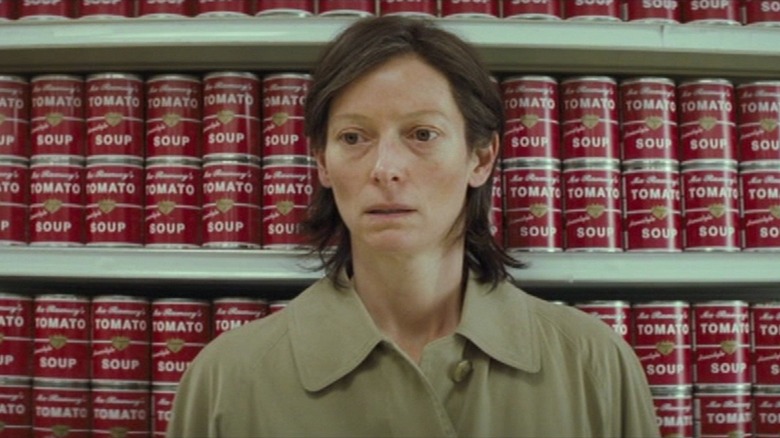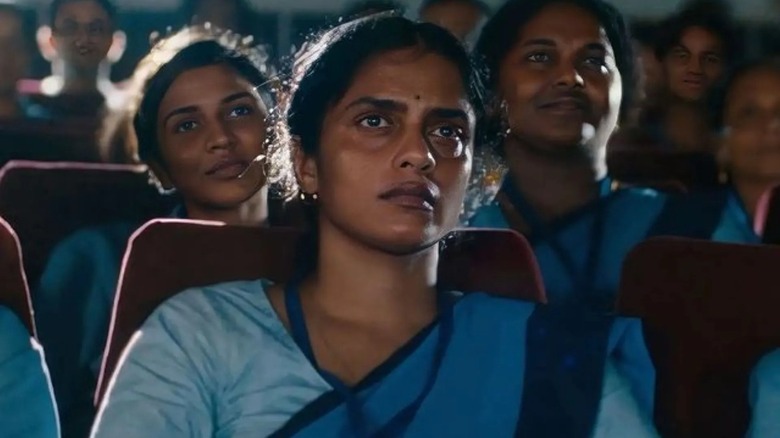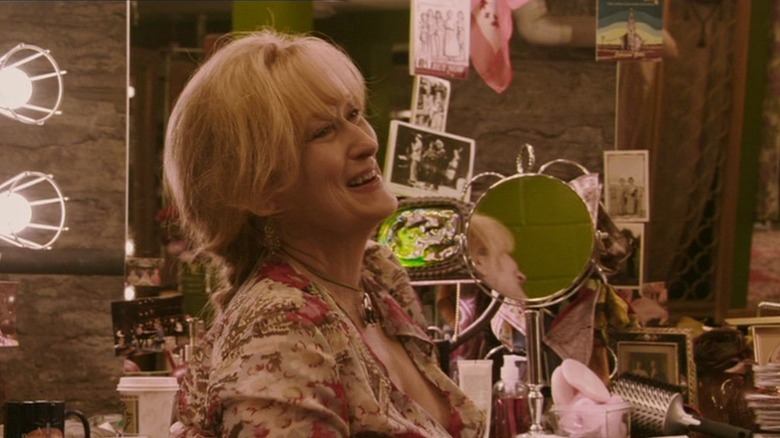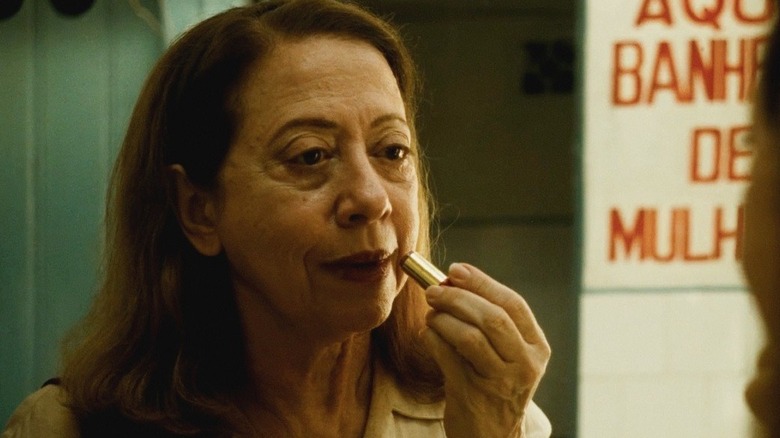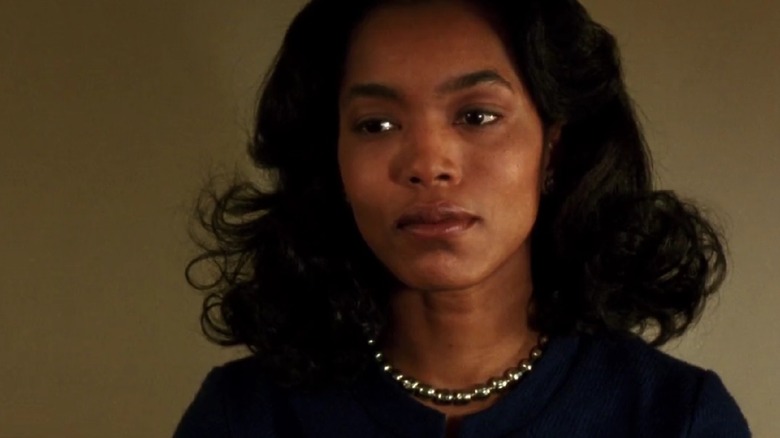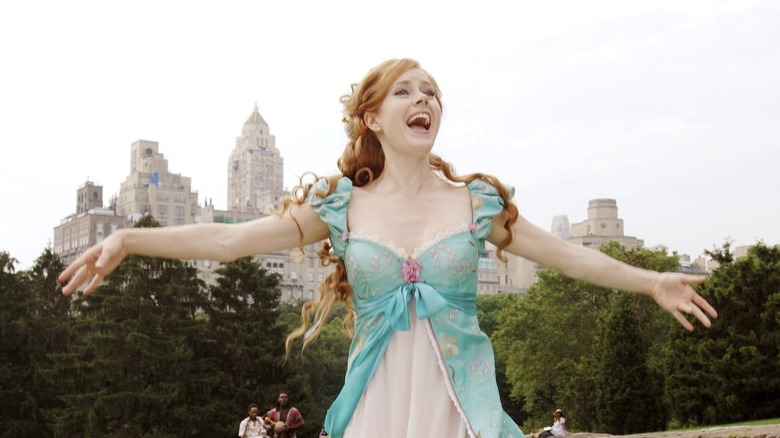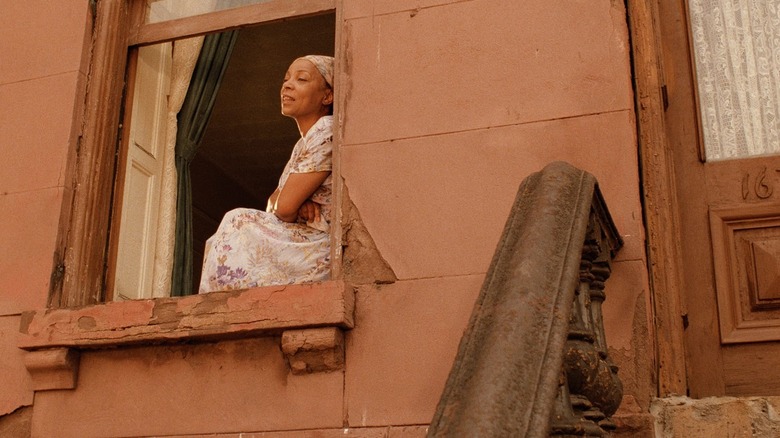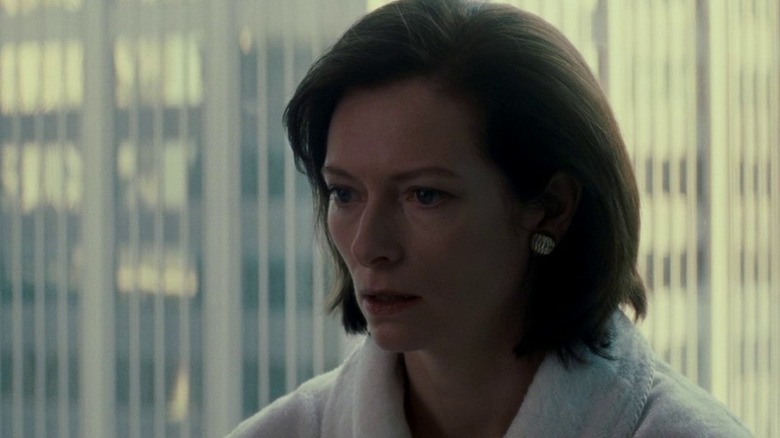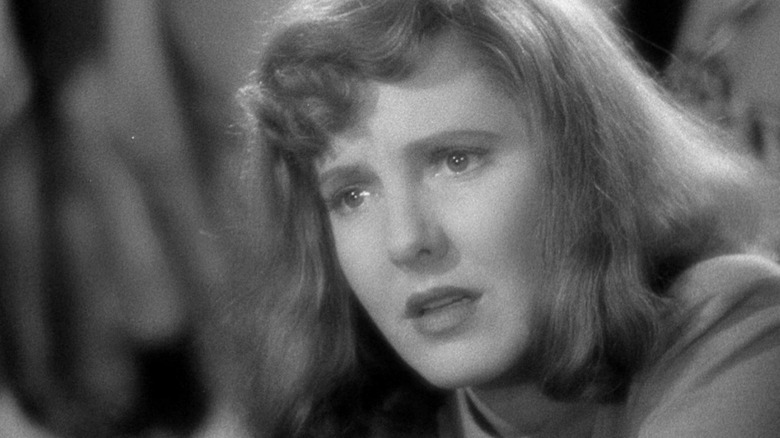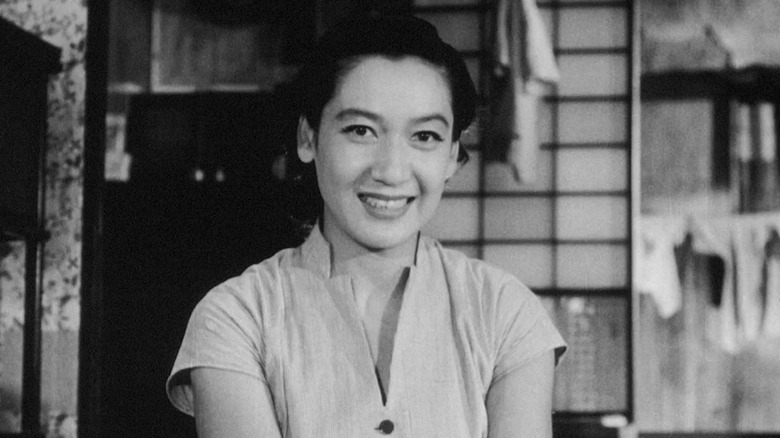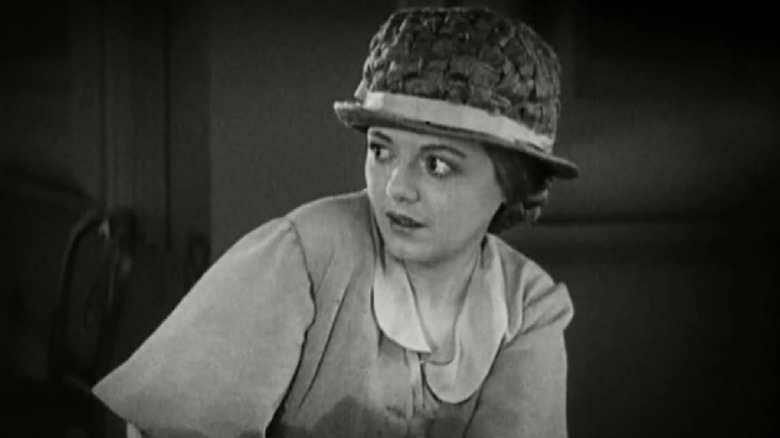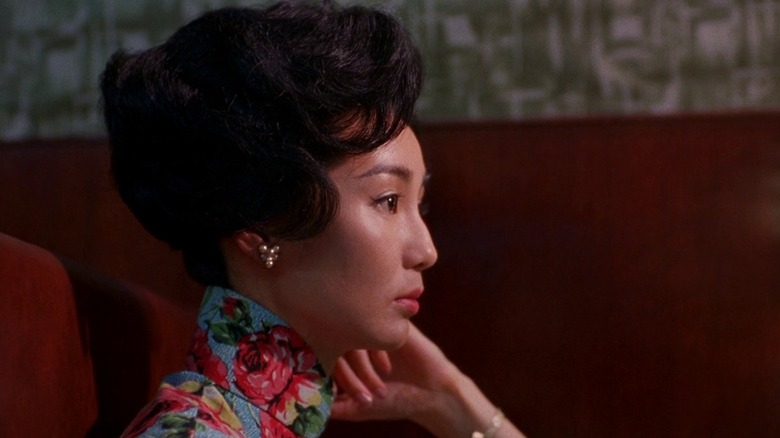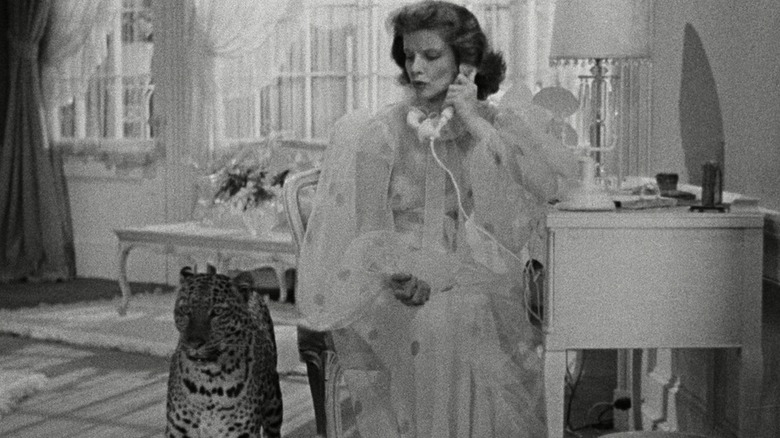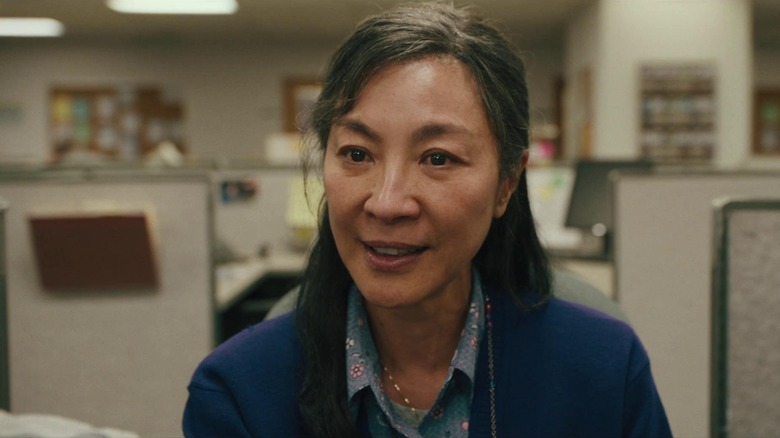The 13 Best Actresses Of All Time, Ranked
"Women, they have minds, and they have souls, as well as just hearts," as a wise Louisa May Alcott once wrote. "And they've got ambition, and they've got talent, as well as just beauty." The endless versatility of women has often fueled the finest movies out there, as have tremendous performances from ladies. If there's any element that makes this art form so glorious, it's the on-screen contributions of female actors portraying a wide array of characters. Whether they're heartfelt heroes, nasty villains, disturbed protaganists, or other archetypes, actresses have constantly stepped up to the plate with unforgettable performances.
Trying to narrow down the 13 greatest actresses of all time (ranked from "least greatest" to best) is a challenging task. There are so many icons out there from over 100 years of cinema history that even titans like Margot Robbie, Bette Davis, and Viola Davis somehow didn't make this list. However, the ones that did make the cut reflect the exciting, limitless possibilities for women in cinema and how much the artistic contributions of actresses have shaped this medium.
13. Kani Kusruti
Many of the artists on this list have been performing for decades or established legendary careers in cinema's earliest days. However, it's also important to sing the praises of women who are modern-day icons, proving that the 21st century still can yield unforgettable performances. There are plenty of ladies who could showcase this reality (including Margot Robbie and Ayo Edebiri), but an especially compelling, extraordinary actress is Kani Kusruti. Her career in India's Malayalam film industry began in 2003. From there, titles like 2010's "Cocktail" garnered her an immensely positive reception. However, it was in 2024 that Kusruti received a new level of global fame with "Girls Will Be Girls" and "All We Imagine as Light." Across these two films alone, Kusruti is unrecognizable, her range staggering.
In "Girls Will Be Girls," her work as Mother Anila suggests quiet yearning to be a part of her daughter's life. Meanwhile, "All We Imagine as Light's" Nurse Prabha is a much more buttoned-up human being with no time for youthful digressions. These radically different roles are handled with equal levels of finesse by Kusruti. Under director Payal Kapadia's subdued direction in "All We Imagine as Light," Kusruti especially excels showcasing Prabha's nuanced interior with just the slightest movement of her body. Both of these roles were remarkable achievements following up on an already tremendous body of work. If you want proof of how modern-day leading ladies are continuing to deliver legendary work, look no further than Kani Kusruti's artistic efforts.
12. Meryl Streep
There's no way one could talk about the best actresses of all time without mentioning Meryl Streep. What's remarkable about Streep is how even her least famous performances are astonishing creations. Playing Karen Silkwood in "Silkwood," for instance, saw Streep effortlessly portraying a normal woman going up against immense corporate enemies. As Julia in "Defending Your Life," she exhibited incredible chemistry with Albert Brooks while exuding a soulfulness that beautifully accentuated the film's poignancy. Let's not forget her lived-in vocal work as Felicity Fox in "Fantastic Mr. Fox."
Across these and other endlessly varied performances, Streep cultivated a reputation for committing 110% to whatever character was thrown her way. Her work also lent dimension to figures that American society often outright erased. Divorced mothers in "Kramer vs. Kramer," protestors in "Silkwood," a war bride in "The Bridges of Madison County" — the unspeakably famous Streep often zeroed in on the nuances that defined unspoken lives. Plus, despite her prestige, Streep delightfully embraced sillier roles, like the musical shenanigans in "Mamma Mia!" That's one of the many reasons Meryl Streep is still so closely associated with quality acting.
11. Fernanda Montenegro
Cinema history is littered with endless retellings of an older person reluctantly taking in some precocious youngster and, over a feature-length runtime, reconnecting to their humanity by caring for the child. In the 1998 Walter Salles directorial effort "Central Station," though, Fernanda Montenegro made that archetype brand new with her potently detailed performance as Dora. Everything about this woman, particularly her body language, feels so specific to Dora. She isn't just a hodgepodge of other similar cinematic protaganists. Montenegro's portrayal of Dora's withdrawn tendencies makes subsequent scenes, where she begins to care for Josue (Vinícius de Oliveira), unspeakably devastating. In Montenegro's hands, the tiniest displays of Dora's interiority radiate with power.
This absolute legend of the Brazilian art scene has left her mark on every medium possibly in the country, including stage work, television, and, of course, movies. The latter realm has seen her deliver beloved turns in titles like "They Don't Wear Black Tie" and "Invisible Life." Her cinematic exploits have even extended to the 2024 best picture Oscar nominee "I'm Still Here," where she delivers a mesmerizing dialogue-free performance in the feature's final scene. "Central Station's" Dora is unquestionably one of the most vivid displays of Fernanda Montenegro's talent. However, it's far from the only time she changed cinema with her gifts.
10. Angela Bassett
Among the faces that defined American '90s cinema was Angela Bassett. By 1991, she was already showing up in prominent roles in classics like "Boyz n the Hood." By 1992, she fully emerged as a star playing Betty Shabazz in "Malcolm X." Bassett's talents were solidified in this role, particularly in how she was able to exude a captivating aura even when sharing the screen with Denzel Washington as the film's titular lead. From there, Bassett kept on delivering some of the decade's most revered performances in titles like "What's Love Got to Do With It," "Passion Fish," and "Waiting to Exhale."
Today, Bassett's known for tackling authoritative figures in blockbusters like "Black Panther" and "Mission Impossible – The Final Reckoning," leaning on her gifts for mustering a commanding sensibility like no other. To be sure, Bassett's screen presence does make one stand up at attention. However, what's really impressive about Bassett is her gift for exuding tangible life within heightened or grand historical confines. Even in the near-future domain of "Strange Days," Bassett conveys a palpable everyday spirit. As Betty Shabazz in "Malcolm X," Bassett imbued ordinary qualities into a woman involved in tremendous American history. Whether she's delivering a grandiose monologue or embodying an ordinary woman, Angela Bassett's range can handle anything.
9. Amy Adams
Many performers have done pastiches or parodies of classical bubbly Disney princesses. Amy Adams, though, fully embodied this cultural archetype in 2007's "Enchanted" when she played Princess Giselle. There wasn't a hint of irony in her immensely entertaining body language and vocal talents. Every fiber of her performance was drenched in commitment. But the gifts of Amy Adams go far beyond just how well she harmonized in "Enchanted." In 2012's "The Master," Adams divinely portrayed a woman embodying quiet power. Her character, Peggy Dodd, was the wife to The Cause leader Lancaster Dodd (Philip Seymour Hoffman), but Adams constantly conveyed Peggy being the real power behind this movement, even when she's standing still in the background.
These are just two of the many incredible performances Amy Adams has blessed the world with in her awe-inspiring career. She exhibited captivating reality amidst sci-fi confines in "Arrival." 2013's "Her," meanwhile, saw her effortlessly mustering a nonchalant yet insightful personality. Adams even captured the spunky spirit of Rosalind Russell and other screwball comedy legends in her Amelia Earhart performance in "Night at the Museum: Battle of the Smithsonian." There's no end to what she can do.
8. Ruby Dee
Ruby Dee's performance as the experienced, authoritative Mother Sister in "Do the Right Thing" was heavily informed by Dee's own silver screen legacy, her instant gravitas and experienced aura rooted in Dee's decades of film acting. This included her work in two of the best movies of the 1960s, "A Raisin in the Sun" and "Uptight." Though radically different roles, Dee was engrossing in each project. Playing Ruth Younger in the dialogue-driven production "A Raisin in the Sun," in particular, let Dee flex her tremendous acting chops. Handed several monologues to deliver, Dee flourished working with Lorraine Hansberry's exquisite dialogue. After this decade, Dee became tragically scarce in theatrical cinema until 1989's "Do the Right Thing," though her memorable work as Ruth in "Buck and the Preacher" reaffirmed how Ruby Dee could wring so much out of even minor roles.
A late career renaissance spurred on by her seminal "Do the Right Thing" work allowed Ruby Dee to once more grace the silver screen with further roles in titles like "Jungle Fever." As late as 2007, Dee was still upstaging legends like Russell Crowe and Denzel Washington with her terrific performance in "American Gangster." For nearly 70 years, theatrical movies benefited from Ruby Dee's versatility and enthralling humanity. Somehow, a performance as incredible as Mother Sister in "Do the Right Thing" is only the tip of the iceberg when it comes Ruby Dee's gifts.
7. Tilda Swinton
Tilda Swinton's greatness can often be easy to take for granted. Her immense talent is such common knowledge that lingering on it can feel like hammering home the obvious. Yet, there's so much more to Swinton than her penchant for unexpected costumes or bold acting choices. For one thing, Swinton, despite her heightened media persona, has no problem stepping into more naturalistic confines in titles like "Michael Clayton" or the two "Souvenir" features. Swinton can go entertainingly bold like nobody else when movies like "Snowpiercer" or "Suspiria" require it. However, she's just as mesmerizing inhabiting quiet pieces of slow cinema like "Memoria" or grounded, turmoil-ridden figures in titles like "The Room Next Door." We all know Swinton is a gifted performer, but her versatility is easy to forget.
Plus, who else could so thoroughly commit to the exquisite oddball details in Swinton's most memorable off-kilter roles we see in "Problemista" or "The Grand Budapest Hotel?" Swinton's audacious performances are rooted in specificity and tangible understanding of what makes these unforgettably distinctive humans tick. Swinton's confidence and talents were even apparent in her earliest acting turns, including her initial collaborations with Derek Jarman in the late '80s. It's wise to fully appreciate an artist as consistently boundary-pushing as Tilda Swinton.
6. Jean Arthur
At the start of "Mr. Deeds Goes to Town," Jean Arthur's Louise "Babe" Bennett is introduced fiddling with a yo-yo instead of listening to her insistent editor. Bennett is so engrossed with her yo-yo that she even shows off her accomplishments to her boss. It's a charming display of ordinariness, just the kind of instantly endearing behavior Arthur mastered in her career. From the moment she walked onto the screen in a motion picture, Arthur captured one's heart and sympathy. This made her the perfect figure to anchor the heart of movies like "You Can't Take It with You" or "Mr. Smith Goes to Washington." Effortless, believable warmth just radiated off Arthur.
Arthur wasn't just good for eliciting compassion from moviegoers. Titles like "The Devil and Miss Jones" and "The More The Merrier" also demonstrated her gift for screwball comedies. Whether it was nailing physical gags or finding just the right way to land an obliviously hysterical line, Arthur was a riot in this domain. Impressively, she also soared in the grim, contemplative 1950s Western "Shane" in her final film role. Jean Arthur could do it all.
5. Setsuko Hara
Not just anyone could anchor movies directed by Yasujirō Ozu. This auteur's distinctively methodical filmmaking style could leave countless other performers, no matter how talented they were, stranded. Setsuko Hara, though, fit into these productions like a glove. With her striking yet appropriately reserved work in some of Ozu's most beloved masterpieces, Setsuko Hara immediately secured a slot for herself in the pantheon of all-time great performers. This included her essential work anchoring "Tokyo Story" as Noriko Hirayama. A beacon of light in a film intentionally full of loved ones turning their backs on their elders, Hara's compassionate presence was utterly essential.
Meanwhile, even beyond her acclaimed exploits with Ozu, Hara secured an impressive body of work that included headlining well-reviewed Akira Kurosawa features and her beloved performance as "Sound of the Mountain's" protagonist. All the while, Setsuko Hara demonstrated a sensational gift for drawing in audiences even with her naturalistic, unshowy performances. Hara didn't need elaborate prosthetics or endless shouting to make viewers stand at attention. She instead gripped people's eyes with subtly compelling figures ripped straight out of reality. Hara's work reinforced the emotional depth of ordinary souls — just one of many achievements she achieved in her remarkable career.
4. Janet Gaynor
One of the greatest movies in history, "Sunrise: A Song of Two Humans," would be nothing without its top-billed performer, Janet Gaynor. This silent cinema legend solidified her reputation just with her "Sunrise" performance as The Wife. With no dialogue by her side, Gaynor's Wife still vividly communicates personality and a flurry of complicated emotions towards George O'Brien's The Man (her husband). There's a scene here (all framed in a single shot) of The Wife trying to nibble on food before slowly bursting into tears and collapsing her head on the table. The way anguish creeps up on a woman trying to navigate reality with dark matters clouding her mind hits like a ton of bricks in Gaynor's skillful performance. Meanwhile, moments of romantic euphoria between "Sunrise's" leads radiate with authenticity thanks to Gaynor's excellent chemistry with O'Brien.
Gaynor's incredible chops were apparent throughout the entire 1920s and into iconic 1930s works like the original "A Star is Born." With a title like "7th Heaven," Gaynor once again balanced vividly realistic emotions with delightfully heightened flourishes common in silent cinema acting. Over a century since she reigned as a movie star, Janet Gaynor's artistic legacy is still making lots of noise.
3. Maggie Cheung
Ethan Hawke once insightfully observed that, though it's not a profession taken seriously by many, we need poets in this world. After all, as Hawke points out, when heartache plagues our souls, we turn to poems to help navigate these complicated emotions. Great film performances and actors can do the same thing. So it is with Maggie Cheung, who so eloquently communicated romantic yearning in 2000's "In the Mood for Love." This quiet film of sensual tension (between Cheung and fellow silver screen legend Tony Leung) has no sex scenes or explosive monologues to speak of. Director Wong Kar-wai just leans on the subtlest physical details of these performers to communicate romantic desire. Cheung is more than up to the task. She's heartbreaking and profoundly relatable through "In the Mood for Love." Anyone whose been fixated on a crush that can never be will feel like they're gazing into a mirror watching Cheung's work.
Cheung is so versatile as a performer, though, that it's not just subdued yearning that she's gifted with handling. Seven years earlier, Cheung made filmgoers explode with joy as she sauntered across the screen in short hair, brandishing a shotgun and a devil-may-care attitude in the vibrant action film "The Heroic Trio." Whether she's anchoring outlandish horror fare from director Lam Nai-Choi or shattering the hearts of moviegoers with a Wong Kar-Wai movie, Maggie Cheung is as unstoppable and vital as poetry.
2. Katharine Hepburn
The best actors can make the most out of the tiniest bits of on-screen business. Take Katharine Hepburn in 1938's "Holiday" as a shimmering example. A small moment where her character, Linda Seton, tilts the head of a stuffed giraffe while she mimics the same move bursts with personality in her hands. What else could you expect from the spunky queen of American cinema? In titles like "The Philadelphia Story" and "Bringing Up Baby," Hepburn excelled with wacky screwball comedy like nobody else in the business. Cinema has yet to produce an image as hysterical as Hepburn nonchalantly dragging a cantankerous leopard along on a leash. In heavier roles, though, Hepburn was just as engrossing.
The underrated "Long Day's Journey into Night," for instance, saw Hepburn as a matriarch plagued with vulnerabilities, directly contrasting her stalwart media image. Working with filmmaker David Lean on the 1955 drama "Summertime" further reflected Hepburn's range as well as her ability to play characters that weren't just variations on her famous screen persona. Every American cinema performer, regardless of gender, is following in Hepburn's multifaceted footsteps. After all, once you've wrung so much power out of toying with a stuffed giraffe, the bar for acting has been set high.
1. Michelle Yeoh
Michelle Yeoh's notoriety in American culture reached new heights with her Oscar-winning turn in "Everything Everywhere All at Once." Her captivating work as Evelyn Wang is indeed mesmerizing, particularly whenever her character interacts with Stephanie Hsu's Joy. These mother/daughter scenes are utterly overwhelming in their emotional impact thanks to Yeoh's outstanding work playing opposite Hsu. However, "Everything Everywhere All at Once" is just one of many movies Yeoh shines in. For one thing, there's her litany of Hong Kong action films, including "Police Story 3: Supercop," "The Heroic Trio," and "Tai Chi Master." There's also her unforgettable "Crouching Tiger, Hidden Dragon" performance and her integral supporting turn in "Sunshine."
Yeoh can effortlessly play an unpredictable con artist in "A Haunting in Venice," a gentle mentor in "Shang-Chi and the Legend of the Ten Rings," and then a classical rom-com antagonist in "Crazy Rich Asians" without breaking a sweat. She even exuded potent emotion in her voice-over work as a mechanical falcon in "Transformers: Rise of the Beasts," an entry in a franchise that once drained all the humanity out of performers like Frances McDormand. There's absolutely no end to her resourceful ability to play any character. That's why "Everything Everywhere All at Once's" multiversal shenanigans were so perfect for her. Tasking the greatest film actress ever with inhabiting ceaseless versions of Evelyn Wang made the role a microcosm of her endlessly varied career.
